Breadcrumb
Michael G. Scott Award Recipients
The Michael G. Scott Award is given annually to the outstanding graduating senior in the Department of Fisheries Biology at Cal Poly Humboldt. The outstanding senior is selected on the basis of Humboldt GPA and on contributions made to the fisheries profession. The award carries with it a financial gift ($1000), the student name and award recognition are announced during graduation ceremonies, and the student's name is added to a brass plaque that hangs prominently on the second floor of the Fisheries and Wildlife Building.
Some words about Michael Scott as told by his father, Cuthbert Scott:
“Michael was enamored with wild and all living things beginning as a toddler. His greatest interests as he grew up had to do with wildlife. As he grew older these interests focused on fishing. He served 2 or 3 years in Vietnam in support of combat units. After Humboldt, he was one of the helicopter borne firefighters (smokejumpers) and ended up with the U.S. Forest Service as a ranger and fish biologist in Alaska. He spent a lot (probably most) of time in the field and most of his projects had to do with improvement of fish habitat in the Misty Fjords and Tongass NF areas. And, as for many other Humboldt Fisheries Biology students, he loved to fish!”

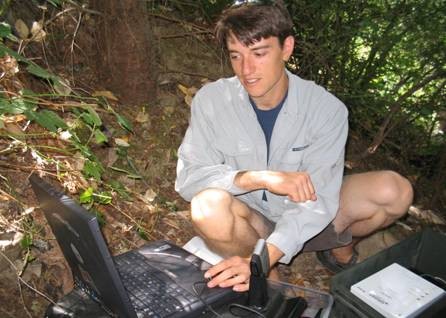
Joshua Strange
Received: 1999
When I graduated from the Humboldt Fisheries Program I was honored to receive the Michael G. Scott Award in recognition of my outstanding efforts during my tenure at Humboldt. Receiving this award crowned a fun and rewarding undergraduate experience and I am very glad that I chose Humboldt Fisheries; I can't think of any other undergraduate fisheries programs in the nation that would have better prepared me for a career in fisheries biology. After graduation I took a year off to travel the Pacific Rim and a year to gain valuable work experience while applying for graduate schools and fellowships.
I was delighted to receive a full ride National Science Foundation Graduate Research Fellowship which helped propel me to the University of Washington 's School of Aquatic Fisheries Science , where I am currently pursuing a PhD in Fisheries with an emphasis on river ecology and restoration. My fieldwork has brought me back to the Arcata area, however, where I am working in collaboration with the Yurok Tribe to undertake a comprehensive study of adult chinook migration in the Klamath River Basin . While I am incorporating a variety of data sources into my study, I rely heavily on radio and sonic telemetry to determine chinook migration behavior. Thus I have the privilege of spending my time catching, tagging, and tracking these majestic fish as they complete their final journey to the place of their birth. In light of the massive adult chinook fish kill on the lower Klamath River in 2002, this work is especially pertinent, and I give thanks to Humboldt Fisheries for giving me the foundation I needed in order to undertake such an ambitious and important research Project.

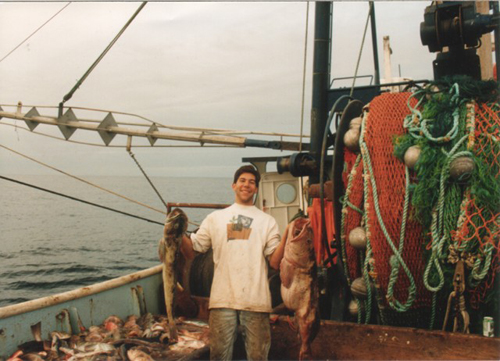
Alan Hicks
Received: 1998
After graduating from Cal Poly Humboldt with a B.S. in fisheries and an applied mathematics minor I moved directly into the graduate program at the University of Idaho to earn a Master's Degree in statistics. My interests were in stock assessment modeling and having a solid foundation in fisheries I starting working to further improve my statistics and math. After three years in that program, working on salmon models, I took the opportunity to work as a fisheries modeler in New Zealand . That changed my life, not only because of the overseas experience, but because my colleagues were well known fisheries scientists and I was exposed to the non-academic side of fisheries research. I performed stock assessments, did statistical analyses, designed and participated in trawl and acoustic surveys, and attended many stock assessment working group meetings.
My thirst for more knowledge grew while in New Zealand and I decided to return to academia by coming back to the states to earn a PhD in fisheries at the University of Washington . I am now learning from faculty and fellow students, and fortuitously, my research is on orange roughy fisheries in New Zealand , giving me the opportunity to travel there every year. I have been performing stock assessments for orange roughy, studying various aspects of orange roughy and their fisheries that would improve the stock assessments, teaching workshops on stock assessment methods and software, and taking classes. I have also remained in close contact with my previous major professors and have helped them simulate salmon populations in the Central Valley of California. I feel that my career is just beginning with a solid foundation beneath me.


Jess Newton
Received: 1997
Jess Newton received a Bachelors of Science in Fisheries from Cal Poly Humboldt in 1997. He then worked for the USGS conducting radio telemetry studies of juvenile Chinook on the lower Snake River . Since 1998, Jess has worked for the US Fish & Wildlife Service at the Red Bluff Fish & Wildlife Office. His current work includes monitoring the response of juvenile and adult salmonids to a variety of restoration actions on Clear Creek and Battle Creek , tributaries to the upper Sacramento River.

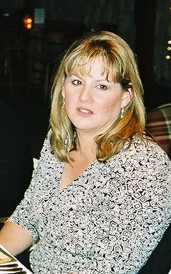
Linda (Mowry) Wise
Received: 1996
I was a re-entry student who went back to school at the age of thirty believing that the health of our fisheries is dependent on sound science, good water quality and responsible land management. The Humboldt Fisheries Program gave me my first academic exposure to those topics and after receiving my Baccalaureate from Humboldt, I furthered my education by obtaining a Master's of Science Degree in Wastewater Utilization, within the Natural Resources in Sciences College, also at Humboldt.
I currently manage the safety and environmental compliance programs for a local solid waste hauler. Before that, I spent four years as the manager of the Yuba/Sutter Local Solid Waste Enforcement Agency (LEA) requiring that I monitor the environmental compliance of solid waste operations within my jurisdiction. At the same time, I taught an evening Biology course at a community college. Also, I have completed a yearlong extensive training program in environmental health that resulted in becoming registered with the California Department of Health Services, a highly sought after certification.
In addition to my professional life, I have been active in many local community activities. I have organized clean-up events and have served on committees designed to address special community solid waste and water issues. In 2003, I chaired the Yuba County Fish & Game Commission and initiated a partnership with the California Coastal Commission to remove 21 tons of illegally dumped material from the Yuba River, the location of the last native steelhead fishery in the world. Before leaving Yuba County, Governor Gray Davis offered me an appointment to serve on one of his commissions based on my community service.
The true fisheries conservationist recognizes that the study of fishes go beyond that of catching and measuring of fish. Fishery students need not be limited in seeking employment with governmental agencies. I believe that it is important that we also seek employment with industries that have impacts on fisheries, because without fish there are no jobs for fishery graduates.
Receiving the Michael G. Scott Award was the highlight of my undergraduate experience at Cal Poly Humboldt (Humboldt). I worked hard for that and have done well since. I wish all the luck to future Fisheries Students.

William Pinnix
Received: 1995
After graduating form Humboldt in 1995, I worked as a teaching and research assistant at Humboldt until moving to Seattle in 1996 to attend graduate school at University of Washington . I received a full scholarship to attend the School Aquatic and Fisheries Science ( http://www.fish.washington.edu/ ) from the Joint Institute for the Study of the Atmosphere and Oceans (http://tao.atmos.washington.edu/main.html ), and focused my thesis work on the effects of climate variability on marine survival of coho salmon in Puget Sound . This work was done in collaboration with the Washington Department of Fish and Game to improve their coho run-size forecast model by incorporating the effects of variability in ocean temperature and freshwater input on tidal mixing in the Puget Sound estuary. I received my Master of Science degree in Fisheries Science in March of 1999.
In 1998, I accepted a Global Ocean Ecosystem Dynamics (GLOBEC) funded PhD scholarship at Oregon State University to study the effects of climate variability on early life growth of sablefish. This retrospective study used otoliths archived at various aging laboratories in Washington, Oregon, British Columbia , and Alaska , as well as otoliths from juveniles collected at sea to determine size at age-1 at the population scale. In late 2001, I took a position with the US Fish and Wildlife Service in Arcata , California conducting radio telemetry studies on green sturgeon, coordinating juvenile salmon out-migrant monitoring on the Trinity River , and conducting an eelgrass/mudflat/oyster culture fish community analysis in Humboldt Bay .

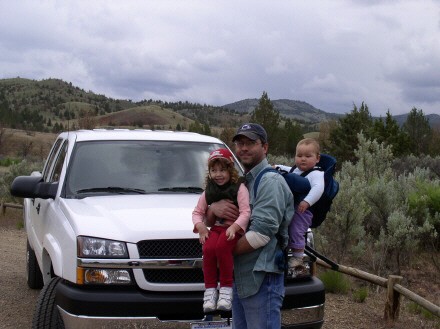
John Britton
Received: 1994
Since graduating from Cal Poly Humboldt , I have had the opportunity to work within the environmental field. For the first couple of years, I actually worked within my discipline (fisheries) with the California Department of Fish and Game as a scientific aide in Northern California . A job assignment on the Tuscarora Pipeline Project in northeastern California introduced me to environmental compliance inspection work. For the next eight years, I worked across the United States and into Mexico on various large-scale construction projects as an environmental inspector. My background and education in fisheries has helped me significantly, particularly dealing with resource agencies (i.e. understanding their concerns for aquatic resources) and in developing appropriate mitigation and protection measures for water resources affected by these projects.
In 2004 I began my own business, K2 Environmental. I look forward to doing some fisheries work and hope to balance resource work with my compliance inspection services. I have recently moved to Bend , Oregon and look forward to doing lots of “fisheries” work (i.e. fishing) when I'm actually at home. I have been married for five years and have two beautiful daughters.


Jeanine Elderkin
Received: 1993
1993 - Jeanine Elderkin


Christopher Coyle
Received: 1992
1992 - Christopher Coyle

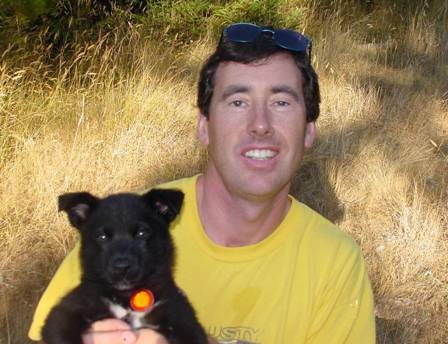
Rod McLeod
Received: 1991
After graduating from Humboldt I moved to MD and obtained an M.S. in Wildlife Management from Frostburg State University, where I studied the response of herpetological communities to timber harvest and prescribed burning. My findings were published in the American Midland Naturalist. While finishing my thesis I was employed by the Appalachian Environmental Laboratory to work on a statewide survey to assess the status of biological resources in Maryland 's nontidal streams. I returned to CA in 1995 and have worked for several private consulting firms, USFWS , CA Dept. of Fish and Game, and most recently, Caltrans. I find I do best in the field, where the politics don’t get in the way. Recently, I moved to California’s beautiful Smith River Country and will likely be involved in salmonid research in the near future.


Choo Guan Yeoh
Received: 1990
1990 - Choo Guan Yeoh





